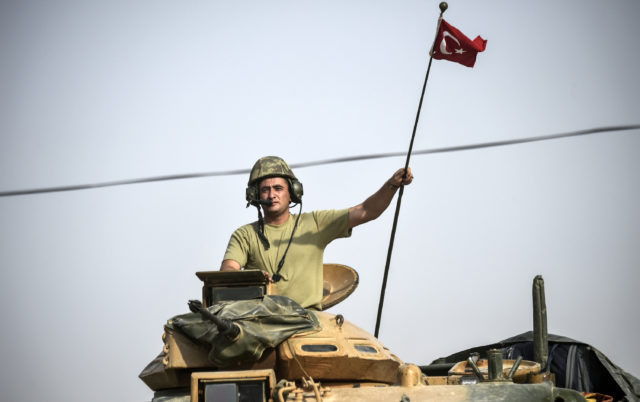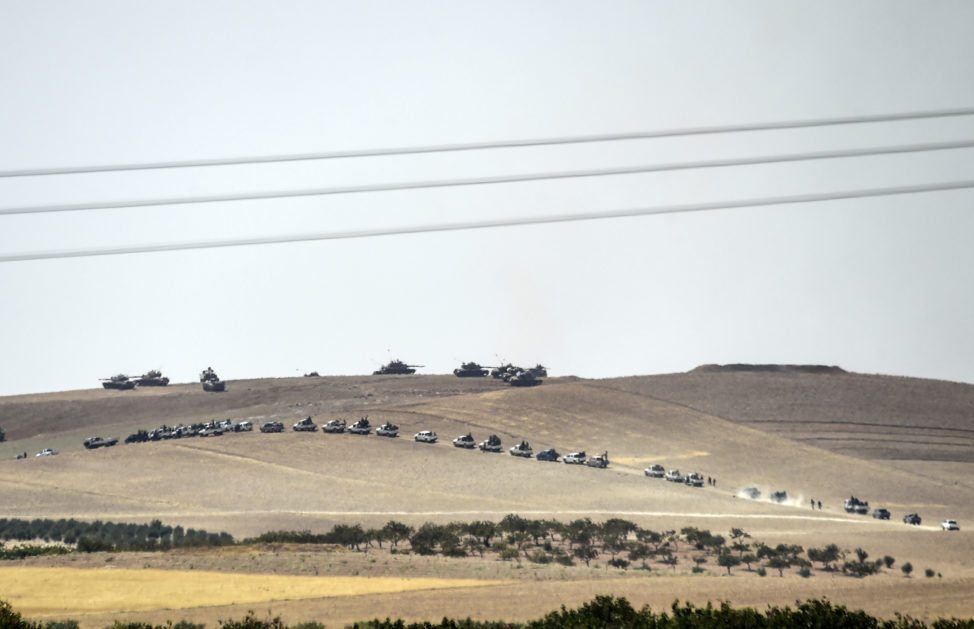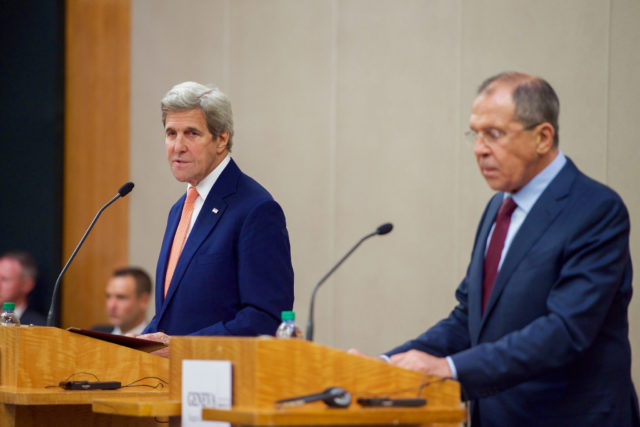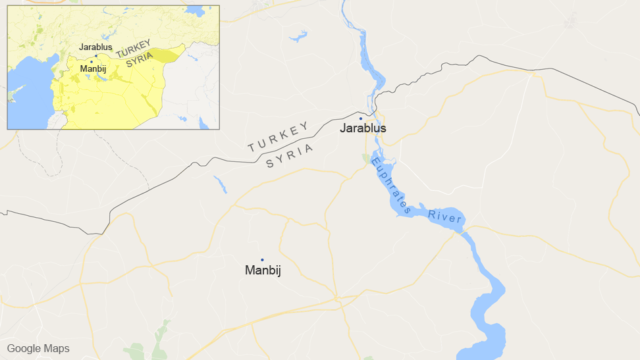
This picture taken around 5 kilometres west from the Turkish Syrian border city of Karkamis in the southern region of Gaziantep, on August 25, 2016 shows a soldier gesturing as Turkish Army tanks drive to the Syrian Turkish border town of Jarabulus. (AFP)
Battle lines and alliances seem to be getting murkier in the U.S. fight against Islamic State in Syria.
Last month, Turkey sent tanks and warplanes over its border with Syria in an offensive against Islamic State forces while also targeting U.S.-backed Kurdish forces, whose success against ISIS brought it too close for Turkey’s comfort.
On the day the offensive began, Vice President Joe Biden stood side-by-side with Turkey’s prime minister, signaling which ally the U.S. was standing behind.
How the U.S. will keep both Turkey and the Kurds on its side is just one of the many diplomatic dramas playing out as the five-and-a-half year Syrian civil war continues with no end in sight.
The U.S.’s Syria Policy Rests on a Treacherous Fault Line
David Ignatius – The Washington Post
Sadly, it’s a classic Middle East moment, when regional players’ mistrust of each other overwhelms their common interest in fighting the terrorist Islamic State. And, equally sadly, it’s a moment that illustrates the frailty of the United States’ Syrian policy, which has built its military plans on the treacherous fault line of Turkish-Kurdish enmity….
Washington must help build governance for a post-Islamic State world. It should sponsor renewed peace talks between Turkey and the PKK. And it should make clear to all that the only durable future is a federalism that can give Kurds, Sunnis, Shiites, Turkmen and other minorities a sense of ownership and control in Syria and Iraq.

This picture taken from the Turkish Syrian border city of Karkamis in the southern region of Gaziantep, on August 24, 2016 shows Turkish army tanks and pro-Ankara Syrian opposition fighters moving two kilometres west from the Syrian Turkish border town of Jarabulus. (AFP)
When Allies Become Enemies (Before the War is Over), Obama’s ISIS Plan Has Another Problem
Gayle Tzemach Lemmon – Defense One
The killing of Islamic State co-founder, operations overseer, and key spokesman Abu Muhammad al-Adnani is good news for the U.S. military and its coalition of forces fighting the terrorist group inside Syria. But it comes after a week that has shown just how hard it is for the U.S. to keep members of the counter-ISIS coalition aligned and focused on the fight against ISIS rather than one another….
Indeed, it is hard to understand why policy is being made seemingly on the fly when the conflict between Turkey and the Kurds was so easy to foresee. And when both partners matter — but one clearly matters more.
Why John Kerry Betrayed Syria’s Kurds, JFK and Woodrow Wilson in Geneva
Seth J. Frantzman – Terraincognita
U.S. Secretary of State John Kerry speaks as he and Russian Foreign Minister Sergey Lavrov address reporters during a joint news conference following a bilateral meeting focused on Syria held August 26, 2016, at the President Wilson Hotel in Geneva, Switzerland. (State Department Photo)
Values matter at home, the diametric opposite values matter abroad. If American foreign policy were to be guided by the same values that supposedly underpin America, as former President Woodrow Wilson felt they should, it would have to support democracy and self-determination. The view of policy-makers today is that supporting self-determination would lead to global chaos.
What is perplexing about US policy is not so much that it automatically and often betrays basic principles that it believes in at home, such as support for minority rights, but that it even betrays basic principles that would fall under realism and pragmatic power-politics abroad. In his 1961 inaugural address John F. Kennedy said, “let every nation know, whether it wishes us well or ill, that we shall pay any price, bear any burden, meet any hardship, support any friend, oppose any foe to assure the survival and the success of liberty.” That may be a rhetorical flourish, but one almost thinks the current policy would be “work with any enemy, cast aside any friend.” This is symbolized by the US-Kurdish relationship.
Turkey’s Troubling Entry into Syria
Christopher Caldwell – The Weekly Standard
Turkey cleared out the ISIS-held town of Jarabulus, on its border. Had it not done so, the Kurds would have. Militias were moving north from the city of Manbij, which the Kurds seized earlier this month. The anti-ISIS part of the Turkish operation was over before it started….Kurdish Manbij, not Arab Jarabulus, is what worries the Turks…



 Turkey cleared out the ISIS-held town of Jarabulus, on its border. Had it not done so, the Kurds would have. Militias were moving north from the city of Manbij, which the Kurds seized earlier this month. The anti-ISIS part of the Turkish operation was over before it started….Kurdish Manbij, not Arab Jarabulus, is what worries the Turks…
Turkey cleared out the ISIS-held town of Jarabulus, on its border. Had it not done so, the Kurds would have. Militias were moving north from the city of Manbij, which the Kurds seized earlier this month. The anti-ISIS part of the Turkish operation was over before it started….Kurdish Manbij, not Arab Jarabulus, is what worries the Turks…